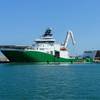Rotterdam Port to Host WPCAP
The first World Ports Climate Action Program (WPCAP) congress will take place in Rotterdam next May. The starting signal for the WPCAP was given in September 2018 at the Port of Rotterdam Authority’s initiative.
Eleven leading European and American ports have now become affiliated with WPCAP: Antwerp, Hamburg, Amsterdam, Le Havre, Barcelona, Gothenburg, Los Angeles, Long Beach, Vancouver and New York & New Jersey. The ports are working on plans to reduce CO2 emissions from shipping and ports and improve air quality.
In the coming spring they will take stock of what has been achieved and will share the results with interested ports, the shipping sector and authorities (port cities and national governments). Agreements will then also need to be made about the follow-up. The Port of Rotterdam Authority is currently Chair of WPCAP and has taken the initiative for this congress.
The five WPCAP working groups currently developing measures are examining topics including efficiency in shipping turnaround time in ports, making loading and unloading of vessels climate neutral, shore power, and alternative fuels. By sharing knowledge, developing joint projects, developing policy and involving the shipping sector in this, the ports expect to be able to achieve more concrete progress than if ports did this individually.
Rotterdam has a long list of achievements with respect to measures to improve air quality and its projects to reduce CO2 emissions. But the shipping sector is an international sector; to have a big impact, European or preferably global cooperation is needed.
Rotterdam aims to take a leading role in the energy transition in terms of both industry and logistics. The projects currently in preparation to make industry in the Port of Rotterdam more sustainable will together realize some 20 - 25% CO2 reduction in the Netherlands by 2030, and that is without ending the use of coal for electricity generation.
In the shipping sector, this spring Rotterdam was the first port to bunker container ships with bio-fuel. To improve the sustainability of shipping, the Port Authority is offering an incentive scheme with a budget of € 5 million.
Clean vessels receive discounts on port dues. LNG is stimulated, as this results in lower CO2 emissions and produces less air pollution. The Port Authority has developed software (Pronto) to improve shipping turnaround time efficiency, and this is now being used by various ports. This reduces the port call time in the port, which in turn reduces emissions. The container terminals on Maasvlakte have electrified almost all their equipment.
All berths for inland vessels are equipped with shore power so vessels do not need to use generators when berthed at the quay. For sea-going shipping, a trial is taking place this autumn to test multiple shore power systems.
Another large shore power project is in preparation for Calandkanaal. And inland shipping is trialing sailing using interchangeable battery systems. These are all concrete projects in which the Port Authority aims to further improve air quality and reduce CO2 emissions.














